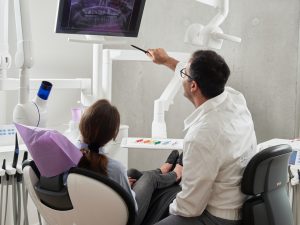
In July 2022, the American Association of Orthodontists (AAO) announced a new partnership to help members of the organization better understand and identify eating disorders.
AAO’s partnership with the National Eating Disorders Association (NEDA) will provide orthodontists with educational resources that can help them spot warning signs of eating disorders in patients. The resources can also help orthodontists understand triggering behaviors and language that could negatively impact patients who are struggling with eating disorders.
According to AAO, more than 65% of orthodontic patients are under the age of 18. Eating disorder symptoms often appear during adolescence, so orthodontists who are sensitive to the signs and symptoms of eating disorders could play a key role in detecting these mental health conditions and providing critical support for patients.
How Eating Disorders Can Affect Oral Health
Eating disorders can have serious short- and long-term effects on a person’s oral health. Often, these complications are the first physical signs that someone is struggling with an eating disorder.
One of the more well-known physical effects of certain eating disorders is acid damage to the teeth and digestive system as a result of self-induced vomiting. However, the reality is that vomiting is just one of many eating disorder behaviors that can harm the health of your teeth and mouth.
Many eating disorders, including bulimia, anorexia, and rumination disorder, can cause someone to suffer from malnutrition. Nutritional deficiencies can lead to various oral symptoms and complications, including dry mouth (xerostomia), tooth decay, and gum disease.
Furthermore, dehydration, which may be a complication of eating disorder symptoms such as self-induced vomiting, excessive exercise, or restricting food intake, can affect saliva production and hurt someone’s dental health.
How Orthodontists Can Help Improve Eating Disorder Care
The new educational partnership between AAO and NEDA may be an important step toward increasing the level of interdisciplinary support that is available for young people who are suffering from eating disorders.
Eating disorders can affect people in many areas of life, including emotional and social well-being, nutrition, and physical health. And frequently, people require care and collaboration from a variety of mental health and medical professionals to sustain long-term recovery.
Someone may struggle for years before they encounter a person or professional who is able to provide support that can help them begin the recovery process.
Increasing eating disorder education for orthodontists may help their patients receive eating disorder treatment earlier in the course of the illness. Early intervention may greatly improve treatment outcomes and reduce the physical and emotional harm a person experiences.
Under the new AAO-NEDA initiative, orthodontists will be better equipped to provide eating disorder resources for patients and their families. This may help them feel more comfortable opening a dialogue with patients and discussing potential eating-related concerns and symptoms.
By having the language and resources to begin the conversation, orthodontists might be better able to refer patients to other professionals, such as dietitians, primary care doctors, and inpatient or residential treatment providers, who can offer specialized support.
Well-informed orthodontists can also improve care for patients who are in recovery by being sensitive to how food restrictions for braces could trigger or worsen eating disorder symptoms.
Importance of Compassionate Care
Living with an eating disorder can be a lonely experience that makes you feel disconnected from people and things around you. Eating disorders often reinforce difficult emotions like shame and guilt and can contribute to feelings of depressed mood, anxiety, and low self-worth. Frequently, it can be difficult for someone who has an eating disorder to acknowledge or accept that they may need help.
For these reasons and more, it’s incredibly important for orthodontists and other medical professionals to use compassionate and informed language when they approach a patient who may have an eating disorder.
Madeline Miles, an eating disorder survivor writing under a pseudonym, described her personal experience of receiving meaningful eating disorder support from a dental professional. Miles explains: “I believe it is essential that the dental professional use direct communication and clear language to confront patients in a gentle way about the unusual damage eating disorders inflict on their teeth. … Direct communication is so important, because you may be the only medical professional who notices the symptoms that are indicative of an eating disorder.”
The new partnership between AAO and NEDA is a promising development in eating disorder treatment and sets an example for further interdisciplinary collaboration. Through its partnership with NEDA, AAO plans to make resources available for its members in the fall of 2022.
